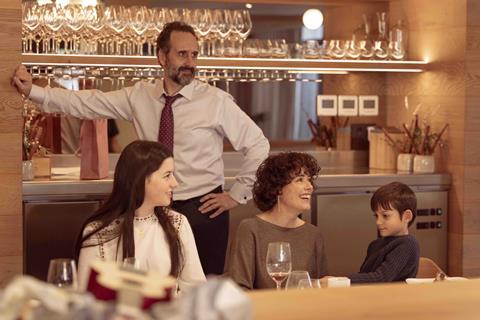Newcomer Blanca Soroa shines in Alaúda Ruiz de Azúa’s’s sensitive San Sebastian Competition title

Dir/scr. Alaúda Ruiz de Azúa. Spain/France. 2025. 115mins.
The coming-of-age movie is very recognisable as a contemporary genre, and is one of the reliable staples of current Spanish cinema. Less easily defined, and certainly less common these days, is the crisis-of-faith drama – but in Sundays, Alaúda Ruiz de Azúa elegantly fuses the two in a narrative that mixes family tensions with a female adolescent perspective.
Perfectly modulated intensity
With a strong ensemble cast showcasing a fine, compellingly elusive lead from newcomer Blanca Soroa, this intelligent, engaging San Sebastian Competition premiere should bring wider international attention to a writer-director previously praised for 2022 debut Lullaby, and who recently ventured into TV drama with Spanish mini-series Querer.
At the centre of Sundays is Ainara (Soroa), a serious, smart, independent-minded 17-year-old boarder at a co-ed Catholic school. In the holidays, she goes home to her family, including widowed restaurateur father Iñaki (Miguel Garcés), grandmother Lila (Mabel Rivera), and her aunt, Iñaki’s sister Maite (Patricia López Arnaiz), an easy-going, trusted mother surrogate to the girls.
Ainara arrives home amid simmering family tensions – involving a huge loan that Iñaki has taken for renovations, and Maite’s currently troubled marriage to affable, easy-going Pablo (Juan Minujín). Then Ainara tells Iñaki that she wants to return to the school’s governing convent for ‘religious discernment’ – an announcement that only becomes a bombshell when they realise that she wants to become a nun within its cloistered community.
The film’s particular intelligence lies in the way that it obliquely illuminates Ainara’s personality, thoughts and emotions, while more directly depicting the effects that her declared vocation has on those around her. Iñaki is determined that his daughter should make her own decision – a contradictory position as, while insisting on his open-mindedness, he is putting his patriarchal foot down in brooking no opposition from the others.
Equally ambivalent is the response of Maite – herself educated in a convent school, now determinedly secular and horrified that Ainara could be missing out on worldly experience, including university and the discovery of love and sex. Indeed, no-one quite knows how to react to evidence of Ainara’s interest in a boy from her school choir (and who knew, incidentally, that convent school choirs in Spain include Nick Cave songs in their repertoire?).
Those around Ainara speculate on her motivations, just as the film prompts viewers to. Is she under the charismatic spell of the convent’s enigmatically smiling Mother Superior (a performance of nicely Zen-like opacity from Nagore Aranburu)? Or does it stem from her seeking understanding and support, having lost her mother at an early age? It is notable, incidentally, that the family members we meet are specifically on the paternal side, Ainara’s late mother being disparaged among them.
For much of the time, Ainara’s family do not voice themselves in anything other than quiet, detached determination – until a climactic sequence when the girl undergoes a real-time struggle with her faith. The culmination of a calm, even-registered performance, this long-awaited raising of the emotional and spiritual ante represents a formidable challenge to young Soroa’s acting prowess, and she – capably steered by Ruiz de Azúa’s sensitive direction – rises to the occasion with moving, perfectly modulated intensity.
Soroa has a terrific partner and foil in Patricia López Arnaiz, who last year won San Sebastián’s Silver Shell for her lead performance in Pilar Palomero’s Glimmers, and previously appeared alongside Garcè 20,000 Species of Bees. Her Maite is at once Ainara’s closest adult ally and the fiercest obstacle to her achieving her goal – while the girl’s crisis casts a particular light on how Maite views her own life and its current situation. The nuances and subtle prompts to the viewer come undemonstratively but potently to a head in a final shot that is a beautifully succinct demonstration of the fine art of leaving audiences with something to think about.
Production companies: Buenapinta Media, Colossé Producciones, Sayaka Producciones, Encanta Films, Think Studio, Los Desencuentros Pelicula, Movistar +
International sales: Le Pacte, e.riedin@le-pacte.com
Producers: Marisa Fernández Armenteros, Sandra Hermida, Nahikari Ipiña, Manu Calvo
Cinematography: Bet Rourich
Editor: Andrés Gil
Production design: Zaloa Ziluaga
Main cast: Blanca Soroa, Patricia López Arnaiz, Miguel Garcés, Juan Minujín















![[L-R]: Amanda Villavieja, Laia Casanovas, Yasmina Praderas](https://d1nslcd7m2225b.cloudfront.net/Pictures/274x183/6/4/1/1471641_pxl_20251224_103354743_618426_crop.jpg)









No comments yet